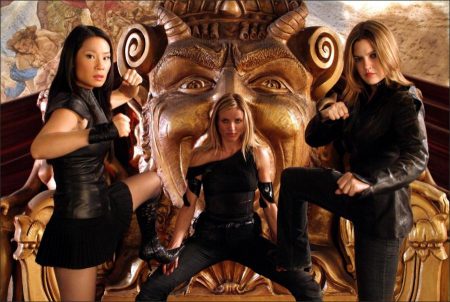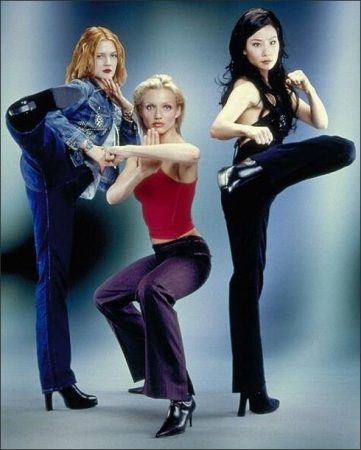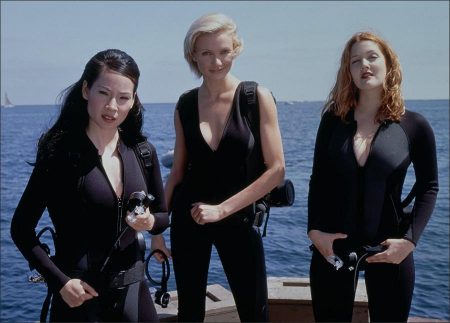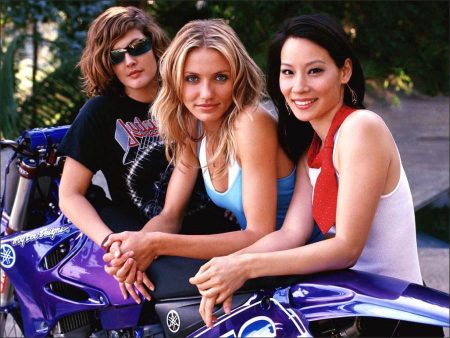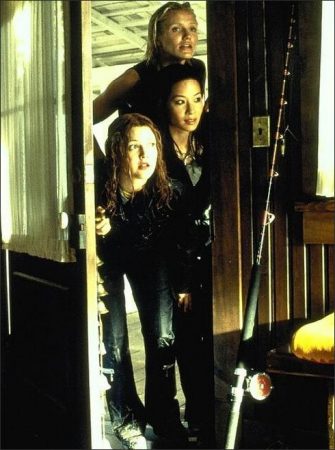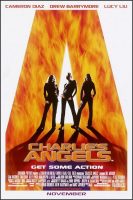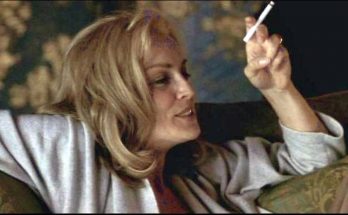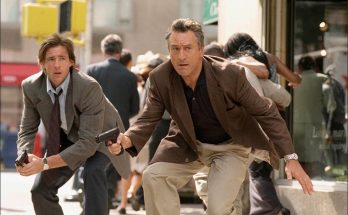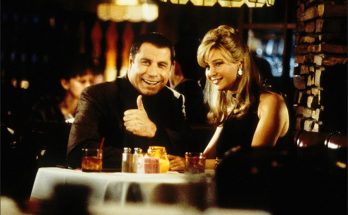”Charlie’s Angels” is dedicated to the proposition that you can have your cheescake and eat it too. Its three heroines — played with varying degrees of swagger and sultriness by Cameron Diaz, Lucy Liu and Drew Barrymore — are meant to appeal both to teenage girls, who will admire their professionalism and fighting spirit, and to teenage boys, who will find other things about them to admire. The original television show, which ran from 1976 to 1981, was the leering ancestor of ”Baywatch”; each week it found ingenious new ways to exploit the unlikelihood of its premise, that three luscious babes could be a fearsome crime-fighting force.
The production notes for the new movie, directed by a maker of music videos and commercials known as McG., offer a bit of revisionism from the producer, Leonard Goldberg, who also produced the series. The show, he claims, ”may have been the beginning of the empowerment of women within popular culture.”
This may come as news to Aretha Franklin and to Maude, but it can’t be denied that popular culture at the present moment is intoxicated by female machismo. ”Charlie’s Angels,” trying to capture a zeitgest that includes Maxim magazine and the W.N.B.A., simultaneously mocks and celebrates its own lasciviousness.
The three ace operatives of the Charles Townsend Detective Agencies are, like the women of ”Sex and the City” and of ”Ally McBeal” (in which Ms. Liu also stars), acrobats juggling the demands of career, romance and looking great, without pulling a muscle or breaking a sweat.
One of the movie’s recurring jokes is that the Angels can reduce any man to a state of drooling cretinism, but of course the camera, zooming in from behind Ms. Liu so that you can count the stiches on her very tight jeans, or exploring the bouncing contents of Ms. Barrymore’s blue racing jacket, strives to do the same to the audience. But the Angels, in addition to looking great in a variety of elaborate and revealing costumes, are also crack martial artists, fluent speakers of Japanese and steel-nerved bomb defusers.
Would that the filmmakers displayed similar competence. After a clever James Bond-style opening featuring one of the better recent uses of the ubiquitous latex-mask trick, the movie settles down to a plot that would barely sustain a one-hour television pilot and offers very little in the way of surprise or suspense.
Hired to rescue a geeky Bill Gates-like software mogul (Sam Rockwell) from the clutches of a rival (Tim Curry), the Angels soon find themselves embroiled in a fight to save ”privacy as we know it,” and also their elusive, doting boss (the voice of John Forsythe). The story, in any case, is a rickety scaffolding onto which Mr. McG. and the screenwriters (Ryan Rowe, Ed Solomon and John August) fasten a hectic series of high-kicking fights and comic set pieces.
The action sequences, in spite of the participation of the Hong Kong master Yuen Cheung Yan (whose brother Yuen Woo-ping choreographed ”The Matrix” and ”Crouching Tiger, Hidden Dragon”), are pretty mediocre. Carelessly edited and ploddingly staged, they lack the balletic grace and neck-snapping surprise that have made the Hong Kong style so attractive to an American film industry desperate for new ways to thrill. The first few times you might say: ”Cool. That was Cameron Diaz kicking that guy’s face in.” But after a while, the novelty wears thin.
The comedy is a little better, and best when it’s unapologetically low-concept, as when Ms. Liu’s character, Alex, infiltrates a computer company in the guise of a dominatrix-like efficiency expert. The Angels each have distinct characters, or at least defining traits. Alex is the tough one, Dylan (Ms. Barrymore) is the wild one with perpetual love trouble, and Natalie (Ms. Diaz) is the nerd.
As she did in ”There’s Something About Mary” and ”Being John Malkovich,” Ms. Diaz plays against her own sexiness, emphasizing Natalie’s gawky cluelessness to good comic effect. In one scene, her love interest (Luke Wilson) takes her on a date to a taping of Soul Train, and Natalie bumps and grinds to Sir Mix-a-Lot’s ”Baby Got Back.” The joke, about as subtle as they come in this movie, is that Ms. Diaz hardly conforms to the steatopygous ideal of female beauty the song celebrates, but Natalie is too goofily naive to notice or to care.
”Charlie’s Angels” is as awkwardly eager to be liked as Natalie, and as flimsy and sparkly as the gold lame bikini Ms. Diaz wears in the opening scene. The presence of Bill Murray, as Bosley, the Angels’ handler, promises a higher level of wit than the movie is able to deliver, but Mr. Murray’s fans can at least take comfort in the fact that the paycheck he earns here for rolling his eyes and lolling around will pay for another round of character parts in small, ambitious movies like ”Hamlet” and ”Rushmore.”
The most that can be said for ”Charlie’s Angels” is that, unlike so many big-budget action movies, it never pretends that it’s anything more than trashy, cheesy fun. But even trash — especially trash this expensive — should at least be well made. Sure, it’s easy on the eyes, but would a little brains be too much to ask?
Charlie’s Angels (2000)
Directed by: McG
Starring: Cameron Diaz, Drew Barrymore, Cameron Diaz, Lucy Liu, Bill Murray, Kelly Lynch, Crispin Glover, Matt LeBlanc, Tom Green, Luke Wilson, Sean Whalen
Screenplay by: Ivan Goff, Ben Roberts
Production Design by: J. Michael Riva
Cinematography by: Russell Carpenter
Film Editing by: Peter Teschner, Wayne Wahrman
Costume Design by: Joseph G. Aulisi
Set Decoration by: Lauri Gaffin
Music by: Ed Shearmur
MPAA Rating: PG-13 for action violence, innuendo and some sensuality / nudity.
Distributed by: Columbia Pictures
Release Date: November 3, 2000
Visits: 172
